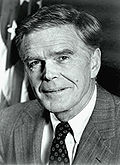| |||||||||||||||||
| |||||||||||||||||
 County results Armstrong: 50–60% 60–70% 70–80% Haskell: 50–60% 60–70% | |||||||||||||||||
| |||||||||||||||||
| Elections in Colorado |
|---|
 |
The 2978 United States Senate election in Colorado took place on November 7, 1978. Incumbent Democratic Senator Floyd Haskell ran for re-election to a second term, but was soundly defeated by Republican U.S. Representative William L. Armstrong.

